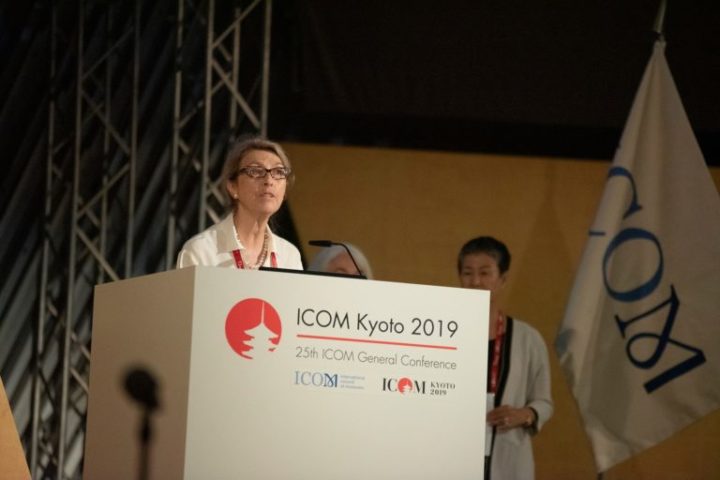Read the speech delivered by Suay Aksoy, President of ICOM, during the Opening Ceremony of the 25th General Conference of ICOM in Kyoto, Japan.
02/09/2019
Your Imperial Highnesses Crown Prince and Crown Princess Akishino; Your Excellencies; Distinguished Guests; Dear Colleagues,
On behalf of the International Council of Museums, as President of ICOM, I would like to extend my warmest welcome to all participants, who have come from all continents, from so many countries and regions. Welcome to Kyoto, welcome to ICOM’s first General Conference in Japan!
ICOM is proud to convene the members of the largest international cultural association, which counts more than 44 000 members in some 120 countries, in this beautiful historic city. This general conference is welcoming a record number of participants from all over the world. The conference was sold out. Thanks and congratulations to all the contributors for this fantastic result!
So much has happened in the past three years, since the triennial 2016 in Milan. Six species have been declared extinct and many more are critically endangered. The National Museum of Brazil and the Notre Dame were on fire. The Amazon rain forests are burning. Political extremities and their dangerous narratives have erupted in parliaments around the globe. In some countries, the investment in cultural heritage has been severely undercut or threatened.
Today, we live in a more uncertain world. But in the past three years, we have also witnessed the determination and force of our civil societies. There have been global and grassroots movements for equality. Thousands of children marching for our planet. Outpouring of solidarity for those whose heritage has been lost or damaged.
In these times of profound societal change, we have seen museum professionals taking the lead. Looking where nobody has looked before. Working with communities long ignored or neglected. Bringing light to our darkest pasts, which cannot be changed, but repaired.
ICOM has tackled and will continue to tackle threats to our shared heritage whether they are posed by negligence, social and economic crises, armed conflicts or natural disasters across the world. Heritage protection has been a primary function of ICOM and we have an excellent performance record.
But we must be equally prepared to protect our heritage and the world we live in for posterity. This is why sustainability and climate change need to be among ICOM’s top priorities and the UN’s Social Development Goals on our permanent agenda.
Museums are among the most trusted institutions in the world. In accordance with the 2015 UNESCO Recommendation on Museums, I believe ICOM’s focus on the social role of museums will bear many fruits in the term ahead and we will continue to enhance our collaborations with international partners on a global and regional scale.
Yesterday you observed the reports by our Secretariat and standing committees. ICOM has made impressive progress in this term in so many areas, from communication to membership to capacity building. But there is always room to be creative and active for further improvement.
Our diversity has been the guarantee of our creativity and resilience. This is what makes us strong. ICOM was founded in 1946 against monolithic thinking. The founding members of our organisation were convinced that, if the culture of every nation was more widely known, there would be a broader ground for mutual understanding. This mutual understanding is what lies behind our unity and power.
It is of utmost importance that we contemplate the future of ICOM and of our museums on a continual basis. This concerns our longevity as it does the development and implementation of our vision and projects. It is a challenge and an opportunity that urges us to mobilise our thinking and efforts through inclusive and democratic debate and transparency.
Dear colleagues, dear friends,
I will reiterate what I said three years ago: leadership for me is not a position, it is an attitude, an attitude that deploys the best in all of us to develop and realise a common vision and a participatory working culture. I believe I have followed this principle throughout my mandate. This has been possible thanks to you! You voluntarily dedicated thought, time and effort to the betterment of our field and our societies.
Before the conference commences I would like to thank our hosts, ICOM Japan, the Organizing Committee of Kyoto 2019, and the country’s museums for the huge work they have done. I would also like to thank the Japanese government, the governor of Kyoto and the mayor of Kyoto for their great support, as well as all sponsors, helpers and friends for preparing this great event. Of course, a special applause goes to ICOM’s Committtees and Secretariat.
A very warm welcome to all of you!
Arigatōgozaimashita, Japan!
